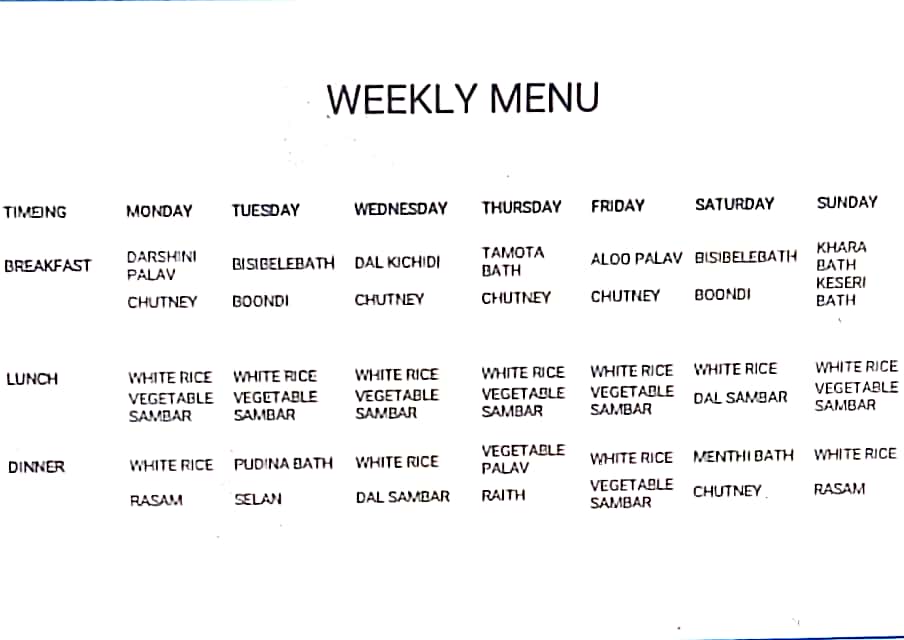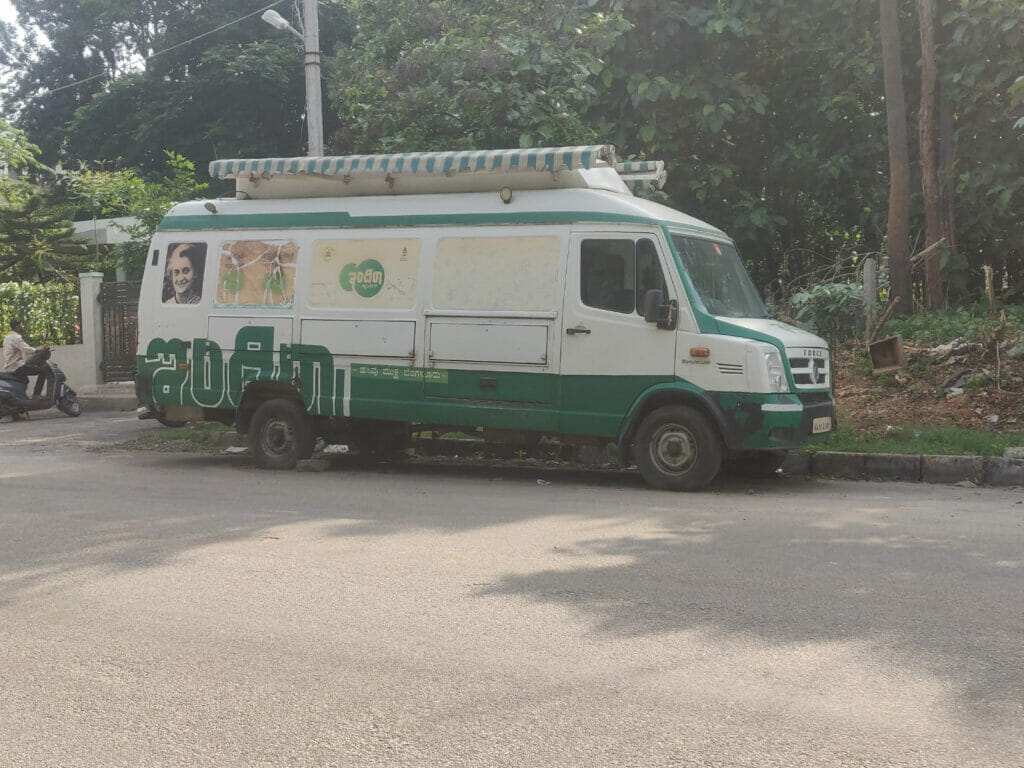Rajanikanth, a local real estate agent, has been visiting the Indira Canteen, located in Majestic, for a month now. He has been having breakfast and dinner regularly and lunch occasionally at the canteen.
The Indira Canteen in Ward 94 in Gandhinagar is located almost equidistant from the city railway station, bus stations, and the metro station. It caters to people from across different socio-economic backgrounds, including drivers and conductors, morning joggers, commuters using different public transport, among others. Many customers are regular patrons of this canteen. There are five employees, who run the canteen, and who perform different roles, such as cashier, server and cleaner.
“In these times, who serves anything at all, even tea, for Rs 10?” asks Rajanikath. “The service and the food served here are really good. The canteen is always crowded. If the food served is bad, why would so many people still eat here?”
Inevitably, not everyone shares Rajanikanth’s opinion on food quality. But almost everyone agrees that the setting up of such canteens has been a good move and a big help to those who cannot afford regular restaurants. A few first time customers we spoke to said the food was reasonable for the money charged.
Read more: All you want to know about Indira Canteens
“The intent behind the initiative is good but it seems like it is done for the sake of doing,” says Chandra Gowda, a KSRTC driver. “Most people who eat here have no other option. But because they pay meagre amounts they should not be forced to eat such bad quality and unhealthy food”.
While Chandra Gowda applauds the canteen staff for their service and efforts at making the best from what is provided, he blames the authorities for not providing enough funds to improve the quality.

Well intended step
Indira Canteens was the brainchild of the former Congress Chief Minister Siddaramiah. Drawing its inspiration from Amma canteens in Tamil Nadu, Indira Canteens were set up to provide three meals a day to the urban poor for a low price.
These canteens operate under the Bruhat Bengaluru Mahanagara Palike (BBMP), with the Chief Health Officer as the key decision maker. Currently, there are 174 stationery canteens and 24 mobile canteens across the city.
According to a source from the BBMP, six mobile canteens aren’t functioning due to lack of space in the respective wards and eight other stationery canteens in the Rajarajeshwari Zone have shut down due to operational reasons.
The 2022-23 BBMP budget allocated Rs 60 crore to Indira Canteens. While the BBMP has the overall responsibility, the daily running and operations of the canteens are handled by private companies through tenders.
Read more: Unsure of next meal, poor Bengaluru slept on empty stomach during lockdown
The canteens operate three times a day. Breakfast is served between 7 am and 10.30 am, lunch between 12.30 pm and 3.30 pm, and dinner between 7.30 pm and 9.30 pm. The average cost for a South Indian breakfast in any small restaurant in the city is Rs 40 or higher. However, Indira Canteens provide breakfast at Rs 5 and lunch and dinner at Rs 10 each. A schedule is in place for each day’s menu. There are no restrictions on who can avail services at the canteen.

Like most institutions, the pandemic forced the canteens to cease their operations temporarily. However, operations were resumed to provide free food during the lockdown to support the economically weaker sections. A staff at one of the Indira Canteens recalls that people waited in long queues to avail free food and the canteens were busiest then.
While canteens at key locations in the city still feed around 100 to 300 people per meal, those in the other locations, especially the suburbs, see fewer people. “There are a few days when there are leftovers,” says Ramesh as he serves his customers in one of the canteens. “But usually we finish serving breakfast by 10 or 10.30 in the morning.”
Reduced budgetary allocation
The allocation of Rs 60 crore for running the canteens in the 2022-23 BBMP budget, is a huge drop from the 2017-18 and 2018-19 budgets, which had allocated Rs 100 crore and Rs 145 crore, respectively. But during the last two years, there hasn’t been any fresh funding from the BJP-run state government.
In 2020, former Chief Minister Siddaramiah had alleged that the Yediyurappa-led BJP government was trying to do away with the welfare scheme by not releasing funds and delaying the clearance of bills to contractors.
Some staffers claim their salaries have been delayed because of non clearance of bills. “If the bill is cleared quickly, we get paid. It has been three months since we’ve been paid”, says an Indira Canteen staff member.
There was also a demand by a senior BJP leader in 2021 for renaming of Indira canteens to Annapoorneshwari Canteens .
Earlier this year, media reports hinted at the handover of Indira Canteens to NGOs like ISKCON and Adamya Chetana.
Response to RTI query
In response to an RTI enquiry, the Chief Health Officer Dr A S Balasundar replied, via email, with the following information:
- The BBMP allocated budget is Rs 60 crore for Indira Canteens and the state government budget for the same is not available.
- All matters concerning Indira Canteens have been handed over to the Health Department of the BBMP, which has not called for any new tenders.
- The ISCKON group had volunteered to distribute food to Indira Canteens, and BBMP has forwarded the same to the state government and other authorities as of June 1 2022. However, no further improvements have been made on the same from their side.
- Expenses, losses or profits, number of employees, payment of salaries of employees, number of canteens and their working status are not available with the main BBMP office. Hence, a request has been sent out to the zonal offices to procure the same.